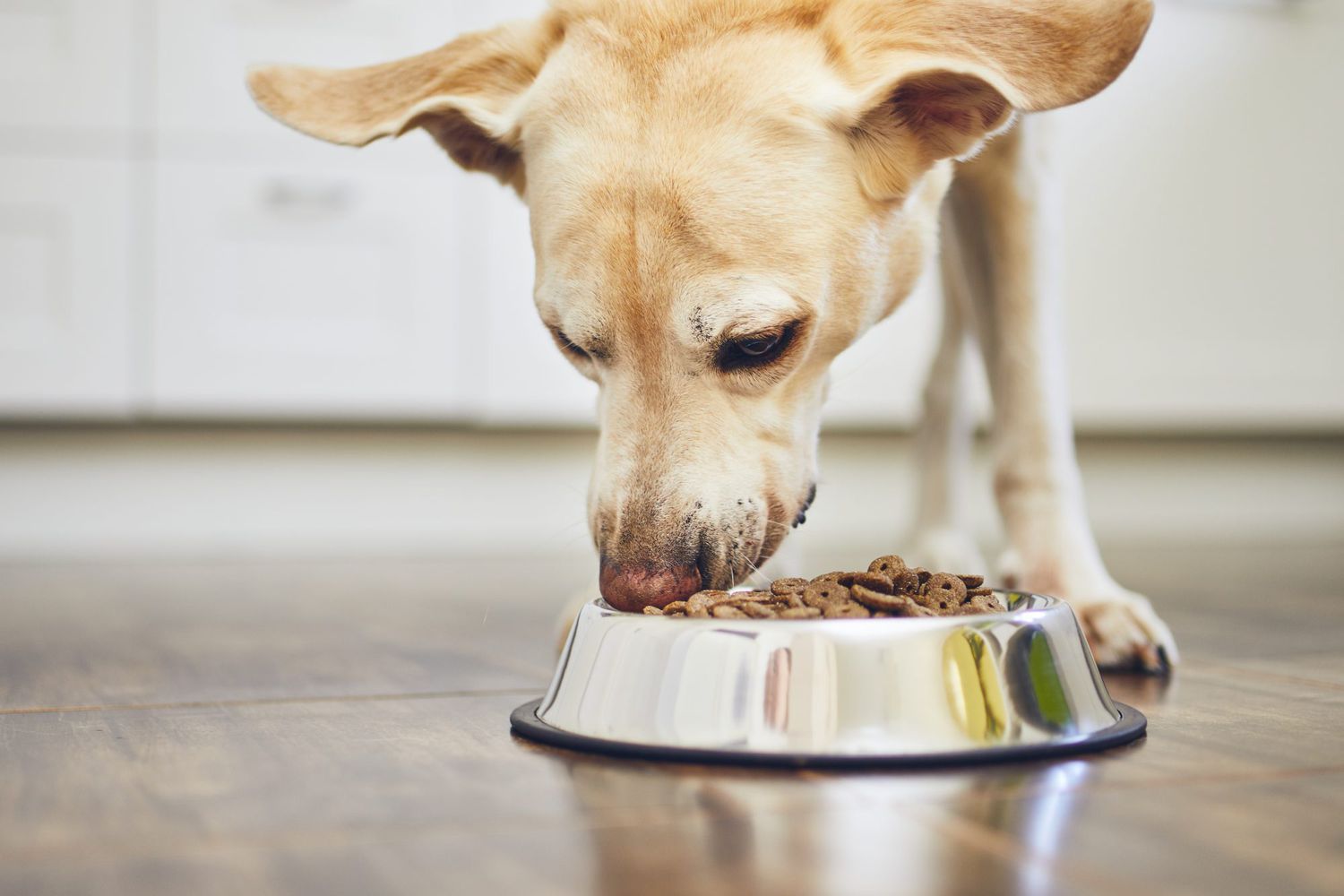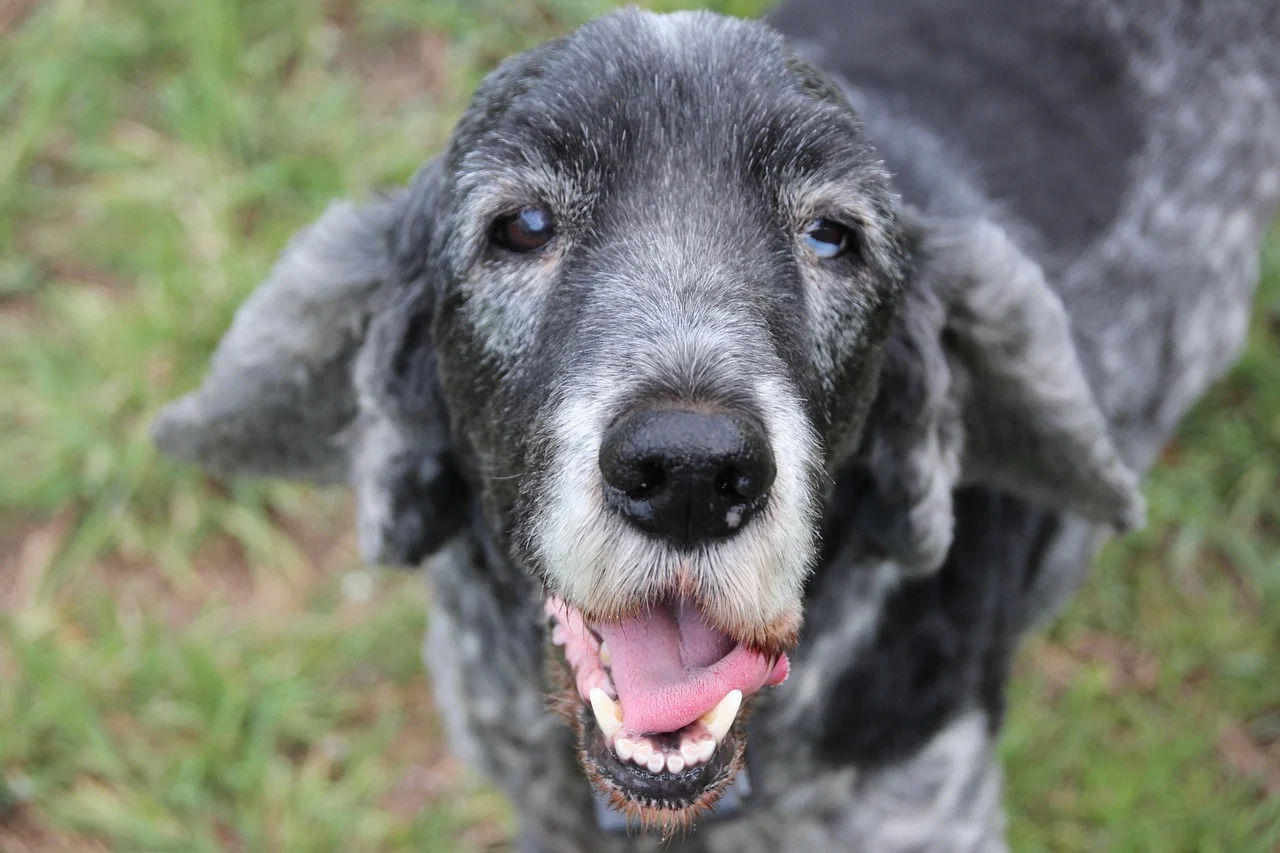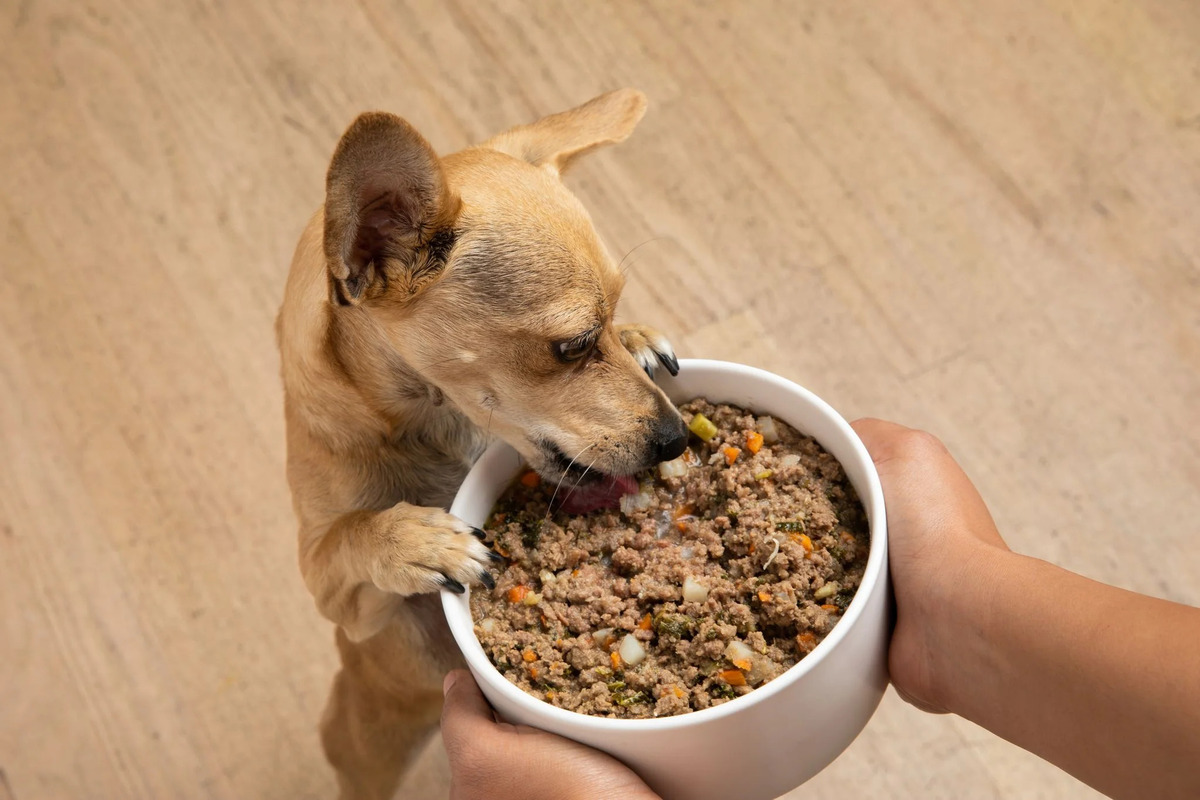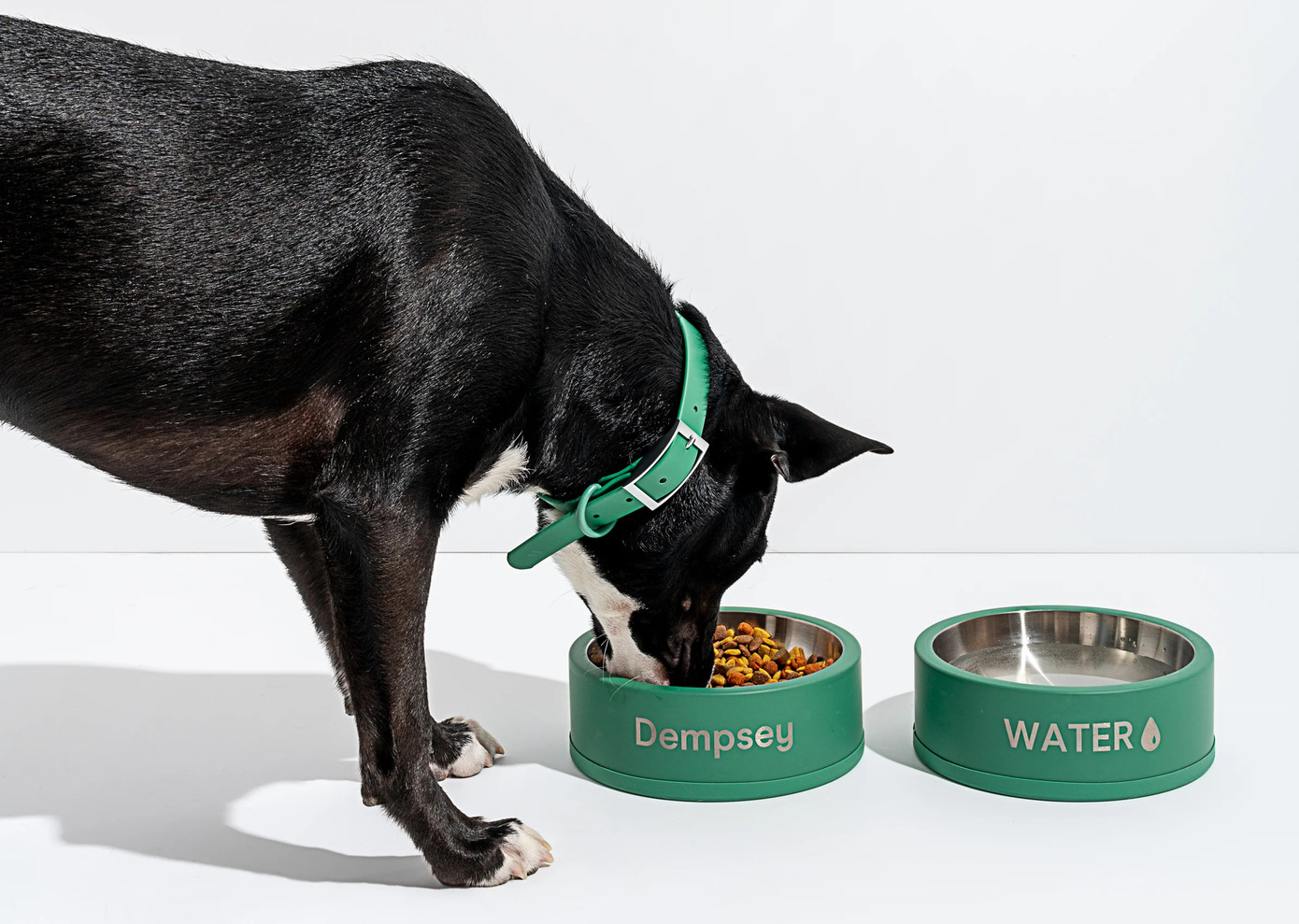Home>Health & Wellness>Nutrition & Diet>How To Feed My Dog A Ketogenic Diet


Nutrition & Diet
How To Feed My Dog A Ketogenic Diet
Published: January 28, 2024
Learn how to feed your dog a ketogenic diet for optimal nutrition and diet. Discover the benefits and guidelines for implementing a healthy, balanced diet.
(Many of the links in this article redirect to a specific reviewed product. Your purchase of these products through affiliate links helps to generate commission for Pawsomeoldies.com, at no extra cost. Learn more)
Table of Contents
Introduction
As pet owners, we constantly strive to provide the best care for our furry companions. One crucial aspect of their well-being is their diet. Just as the ketogenic diet has gained popularity among humans for its potential health benefits, it has also piqued the interest of pet owners seeking optimal nutrition for their dogs.
The ketogenic diet, often referred to as the "keto" diet, is a high-fat, moderate-protein, and low-carbohydrate eating plan. This dietary approach aims to induce a state of ketosis, wherein the body utilizes fat for fuel instead of carbohydrates. While initially developed to manage certain medical conditions in humans, such as epilepsy and diabetes, the ketogenic diet has garnered attention for its potential application in canine nutrition.
In this comprehensive guide, we will delve into the intricacies of feeding your dog a ketogenic diet. From understanding the principles of this dietary regimen to exploring its potential benefits and associated risks, we will equip you with the knowledge needed to make informed decisions about your dog's nutrition. Additionally, we will provide practical insights on transitioning your dog to a ketogenic diet, along with a sample meal plan to kick-start their journey towards a healthier lifestyle.
Embarking on the path of feeding your dog a ketogenic diet requires careful consideration and a thorough understanding of the implications. By the end of this guide, you will be well-equipped to navigate this nutritional terrain and make choices that prioritize your dog's well-being. Let's embark on this enlightening journey to unravel the intricacies of the ketogenic diet for dogs.
Read more: How Do I Start Feeding My Dog A Raw Diet
Understanding the Ketogenic Diet for Dogs
The ketogenic diet for dogs mirrors its human counterpart in many ways. It is a high-fat, moderate-protein, and low-carbohydrate diet designed to transition the body's primary energy source from glucose to ketones. This metabolic state, known as ketosis, is achieved by significantly reducing the intake of carbohydrates and replacing them with healthy fats. By doing so, the body becomes adept at utilizing fat for energy, leading to a host of potential health benefits.
In the context of canine nutrition, the ketogenic diet aims to mimic the dietary patterns of dogs' ancestors, who primarily subsisted on a diet rich in animal proteins and fats. By minimizing carbohydrate intake, the diet aligns more closely with the natural dietary inclinations of dogs, which are carnivorous by nature.
The macronutrient composition of a ketogenic diet for dogs typically consists of approximately 70-80% fat, 10-20% protein, and minimal carbohydrates. This composition is in stark contrast to conventional dog diets, which often contain higher proportions of carbohydrates in the form of grains and fillers.
When dogs consume a high-fat, low-carb diet, their bodies undergo a metabolic shift, relying on fat-derived ketones for energy production instead of glucose from carbohydrates. This transition can potentially lead to improved energy levels, enhanced mental clarity, and better weight management for dogs.
It's important to note that not all fats are created equal, and the ketogenic diet for dogs emphasizes the consumption of healthy fats, such as those found in fatty cuts of meat, fish, and plant-based sources like coconut oil and flaxseed. These fats provide essential fatty acids and support overall health and well-being.
Understanding the ketogenic diet for dogs involves recognizing that each dog is unique, and their nutritional needs may vary based on factors such as breed, age, activity level, and underlying health conditions. Therefore, it's crucial to tailor the ketogenic diet to suit the individual requirements of your furry companion.
By comprehending the fundamental principles of the ketogenic diet for dogs, pet owners can make informed decisions regarding their dog's nutrition, paving the way for potential health improvements and overall well-being.
Benefits of Feeding Your Dog a Ketogenic Diet
Feeding your dog a ketogenic diet can yield a myriad of potential benefits that contribute to their overall health and well-being. Understanding these advantages can empower pet owners to make informed decisions about their dog's nutrition. Here are the key benefits of incorporating a ketogenic diet into your dog's feeding regimen:
-
Weight Management: The ketogenic diet can aid in weight management for dogs, especially those prone to obesity. By minimizing carbohydrate intake and emphasizing healthy fats, the diet promotes satiety and helps regulate appetite, potentially leading to weight loss and improved body composition.
-
Enhanced Energy Levels: Dogs on a ketogenic diet may experience sustained energy levels throughout the day. By relying on fat-derived ketones for energy production, dogs can avoid the energy fluctuations often associated with carbohydrate-rich diets, leading to improved vitality and stamina.
-
Potential Seizure Management: For dogs with epilepsy or seizure disorders, the ketogenic diet may offer potential benefits. While further research is needed in the veterinary field, some anecdotal evidence suggests that the diet's neuroprotective properties could help reduce the frequency and severity of seizures in affected dogs.
-
Improved Coat and Skin Health: The high-fat content of the ketogenic diet can contribute to healthier skin and a lustrous coat for dogs. Essential fatty acids derived from healthy fats support skin integrity and may alleviate certain skin conditions, promoting a shiny and resilient coat.
-
Regulated Blood Sugar Levels: By minimizing carbohydrate intake, the ketogenic diet can help regulate blood sugar levels in dogs. This can be particularly beneficial for dogs with diabetes or insulin resistance, as it reduces the reliance on glucose as the primary energy source.
-
Potential Anti-Inflammatory Effects: The ketogenic diet's emphasis on healthy fats and reduced carbohydrate intake may exert anti-inflammatory effects in dogs. This can be advantageous for dogs with inflammatory conditions, potentially alleviating discomfort and promoting overall well-being.
-
Support for Cognitive Function: The ketogenic diet's influence on brain health extends to dogs, potentially supporting cognitive function and mental clarity. This can be particularly beneficial for aging dogs or those with cognitive decline, promoting mental acuity and overall cognitive well-being.
By embracing the ketogenic diet for dogs, pet owners can potentially unlock these benefits, contributing to their dog's overall health and vitality. It's important to note that individual responses to the diet may vary, and consulting with a veterinarian before implementing dietary changes is crucial to ensure the diet aligns with your dog's specific needs and health status.
Risks and Considerations
While the ketogenic diet for dogs presents potential benefits, it is essential for pet owners to be mindful of the associated risks and considerations. Understanding these aspects is crucial in making informed decisions about implementing this dietary approach for your dog.
Potential Nutritional Imbalance:
The high-fat, low-carbohydrate nature of the ketogenic diet may pose challenges in achieving a balanced nutrient profile for dogs. Carbohydrates often serve as a source of fiber, vitamins, and minerals in conventional dog diets. Therefore, careful planning and selection of nutrient-dense foods are necessary to prevent potential deficiencies in essential nutrients.
Read more: How Much To Feed A Dog On A Diet
Impact on Digestive Health:
Transitioning to a ketogenic diet can impact a dog's digestive system, particularly if the change in macronutrient composition is abrupt. Dogs accustomed to higher carbohydrate diets may experience gastrointestinal disturbances during the adaptation phase. Gradual transition and monitoring of digestive health are crucial to mitigate potential digestive issues.
Individual Variability in Response:
Not all dogs may respond favorably to a ketogenic diet. Factors such as breed, age, activity level, and underlying health conditions can influence how a dog's body adapts to the dietary changes. It's important to closely monitor your dog's response to the diet and make adjustments as needed to ensure their well-being.
Potential for Nutritional Deficiencies:
The restrictive nature of the ketogenic diet, particularly in terms of carbohydrate sources, may increase the risk of certain nutrient deficiencies if not carefully managed. For example, the absence of grains and certain vegetables may impact the intake of essential vitamins and minerals. Supplemental support and strategic food choices are essential to address potential deficiencies.
Consultation with a Veterinarian:
Before embarking on a ketogenic diet for your dog, consulting with a veterinarian is paramount. A professional assessment of your dog's health status, nutritional requirements, and potential suitability for the diet can provide invaluable guidance. Veterinarians can offer tailored recommendations and monitor your dog's progress to ensure the diet aligns with their specific needs.
By acknowledging these risks and considerations, pet owners can approach the implementation of a ketogenic diet for their dogs with a comprehensive understanding of the potential challenges. Careful planning, monitoring, and professional guidance can help mitigate these risks, paving the way for a well-managed dietary transition that prioritizes your dog's health and well-being.
How to Transition Your Dog to a Ketogenic Diet
Transitioning your dog to a ketogenic diet requires a gradual and mindful approach to minimize digestive disturbances and facilitate metabolic adaptation. Here's a step-by-step guide to effectively transition your dog to a ketogenic diet:
-
Assess Your Dog's Current Diet: Begin by evaluating your dog's current diet, including the types of food, macronutrient composition, and any existing health considerations. Understanding their baseline diet provides a foundation for implementing gradual changes.
-
Consult with a Veterinarian: Before initiating the transition, consult with a veterinarian to discuss your intention to transition your dog to a ketogenic diet. A professional assessment of your dog's health status and nutritional requirements will inform the transition process and ensure it aligns with your dog's specific needs.
-
Gradual Reduction of Carbohydrates: Start by gradually reducing the carbohydrate content in your dog's diet. This can be achieved by decreasing the portion of carbohydrate-rich foods such as grains, potatoes, and certain fruits. Simultaneously, begin incorporating small amounts of healthy fats into their meals to initiate the shift towards a higher-fat diet.
-
Incremental Increase in Healthy Fats: Introduce healthy fats, such as coconut oil, fish oil, and animal fats, into your dog's meals in incremental amounts. This gradual introduction allows your dog's digestive system to adapt to the higher fat content while minimizing the risk of gastrointestinal upset.
-
Moderate Protein Intake: While the ketogenic diet emphasizes high fat intake, it's essential to maintain a moderate protein intake for your dog. Ensure that their meals contain adequate, high-quality protein sources to support muscle maintenance and overall health.
-
Monitor Digestive Health and Energy Levels: Throughout the transition process, closely monitor your dog's digestive health and energy levels. Look for signs of gastrointestinal discomfort or changes in energy levels, and adjust the transition pace accordingly. If digestive disturbances occur, consider slowing the transition and providing additional support for digestive health.
-
Complete Transition to Ketogenic Ratio: Over the course of several weeks, gradually transition your dog to a macronutrient ratio that aligns with a ketogenic diet, typically consisting of approximately 70-80% fat, 10-20% protein, and minimal carbohydrates. This gradual adjustment allows your dog's metabolism to adapt to utilizing fat as the primary energy source.
-
Ongoing Monitoring and Adjustments: Once the transition is complete, continue to monitor your dog's health, energy levels, and overall well-being. Adjust the diet as needed based on their individual response and any guidance provided by your veterinarian.
By following this gradual and attentive approach to transitioning your dog to a ketogenic diet, you can support their metabolic adaptation while minimizing potential digestive disruptions. This methodical process prioritizes your dog's well-being and sets the stage for embracing the potential benefits of a ketogenic diet tailored to their individual needs.
Sample Ketogenic Diet Meal Plan for Dogs
Implementing a well-structured ketogenic diet meal plan for your dog is essential to ensure they receive the necessary nutrients while adhering to the principles of the diet. This sample meal plan provides a practical framework for crafting balanced and ketogenic-friendly meals for your canine companion.
Breakfast
- Meal: Scrambled Eggs with Spinach
- Ingredients:
- 2 eggs
- 1/4 cup fresh spinach, finely chopped
- 1 teaspoon coconut oil
- Preparation:
- In a pan, heat the coconut oil over low heat. Whisk the eggs and add them to the pan. Stir in the chopped spinach and cook until the eggs are set. Allow to cool before serving.
- Ingredients:
Lunch
- Meal: Turkey and Green Bean Medley
- Ingredients:
- 1/2 cup cooked ground turkey
- 1/4 cup steamed green beans, chopped
- 1 tablespoon olive oil
- Preparation:
- Mix the cooked ground turkey and steamed green beans in a bowl. Drizzle with olive oil and mix thoroughly. Serve at room temperature.
- Ingredients:
Dinner
- Meal: Baked Salmon with Broccoli
- Ingredients:
- 4 oz. fresh salmon fillet
- 1/2 cup steamed broccoli florets
- 1 teaspoon flaxseed oil
- Preparation:
- Preheat the oven to 375°F. Place the salmon fillet on a baking sheet and bake for 15-20 minutes or until cooked through. Steam the broccoli until tender. Drizzle the salmon and broccoli with flaxseed oil before serving.
- Ingredients:
Snack
- Treat: Peanut Butter and Coconut Bites
- Ingredients:
- 2 tablespoons natural peanut butter (unsalted)
- 1 tablespoon coconut flour
- 1 teaspoon honey (optional)
- Preparation:
- In a bowl, mix the peanut butter and coconut flour until well combined. If desired, add honey for sweetness. Roll the mixture into small bites and refrigerate until firm. Offer as an occasional treat.
- Ingredients:
This sample meal plan emphasizes high-quality protein sources, healthy fats, and minimal carbohydrates, aligning with the macronutrient ratios characteristic of a ketogenic diet for dogs. It provides a variety of nutrient-dense ingredients to support your dog's overall health and well-being while adhering to the principles of the ketogenic diet.
By incorporating this sample meal plan into your dog's feeding regimen and adjusting portion sizes based on their individual needs, you can embark on a journey towards providing them with a balanced and ketogenic-friendly diet tailored to their specific requirements. Remember to consult with your veterinarian to ensure the meal plan aligns with your dog's health status and nutritional needs.
Monitoring Your Dog's Health on a Ketogenic Diet
Monitoring your dog's health on a ketogenic diet is paramount to ensuring their well-being and adapting the diet to their individual needs. Here are essential aspects to consider when overseeing your dog's health while they are on a ketogenic diet:
Regular Veterinary Consultations
Schedule regular check-ups with your veterinarian to assess your dog's overall health and monitor any potential changes related to the ketogenic diet. Professional guidance and tailored recommendations from a veterinarian can provide invaluable insights into your dog's response to the diet and any adjustments needed to optimize their health.
Read more: What Can I Feed My Dog On A Low Fat Diet
Body Weight and Body Condition
Regularly monitor your dog's body weight and body condition to gauge the impact of the ketogenic diet on their weight management and overall body composition. Maintaining a healthy weight is crucial for your dog's long-term health, and adjustments to their diet may be necessary based on their weight trends and body condition score.
Energy Levels and Vitality
Observe your dog's energy levels and vitality throughout the day. The ketogenic diet aims to provide sustained energy derived from fat metabolism, and monitoring your dog's energy levels can offer insights into how well their body is adapting to the diet. Consistent vitality and stamina are indicators of the diet's positive impact on their energy metabolism.
Digestive Health
Assess your dog's digestive health and monitor for any signs of gastrointestinal disturbances during the transition to a ketogenic diet. Keep an eye on their stool quality, frequency of bowel movements, and any indications of digestive discomfort. Gradual dietary adjustments and supportive measures can help mitigate potential digestive issues.
Skin and Coat Condition
Observe the condition of your dog's skin and coat, as these are reflective of their overall health. A ketogenic diet rich in essential fatty acids can contribute to healthy skin and a lustrous coat. Monitoring for any improvements in skin integrity and coat quality can indicate the diet's positive impact on their dermatological well-being.
Read more: How Much To Feed A Dog: Science Diet
Blood Glucose Levels (if applicable)
For dogs with diabetes or insulin resistance, regular monitoring of blood glucose levels is essential when transitioning to a ketogenic diet. Work closely with your veterinarian to assess the impact of the diet on your dog's blood glucose levels and make any necessary adjustments to their insulin regimen or dietary plan.
By actively monitoring these key aspects of your dog's health on a ketogenic diet, you can gain valuable insights into the diet's impact and make informed decisions to optimize their nutritional regimen. Regular observation, coupled with professional guidance from a veterinarian, forms the cornerstone of ensuring your dog's health and well-being while embracing the principles of a ketogenic diet tailored to their individual needs.
Conclusion
In conclusion, the ketogenic diet for dogs presents a compelling avenue for pet owners to optimize their canine companions' nutrition and potentially enhance their overall well-being. By aligning with the principles of a high-fat, moderate-protein, and low-carbohydrate dietary approach, the ketogenic diet aims to harness the metabolic benefits of fat metabolism, mirroring the natural dietary inclinations of dogs as carnivorous beings.
Throughout this comprehensive guide, we have delved into the fundamental aspects of the ketogenic diet for dogs, from understanding its metabolic implications to exploring the potential benefits and associated risks. We have also provided practical insights on transitioning dogs to a ketogenic diet, along with a sample meal plan to facilitate a balanced and ketogenic-friendly feeding regimen.
It is essential to emphasize that the decision to transition a dog to a ketogenic diet warrants careful consideration, individualized planning, and professional guidance from a veterinarian. Each dog's unique characteristics, including breed, age, activity level, and health status, necessitate a tailored approach to implementing and monitoring the ketogenic diet.
By embracing the ketogenic diet for dogs, pet owners can potentially unlock benefits such as improved weight management, sustained energy levels, and support for specific health conditions. However, it is crucial to remain vigilant about potential risks, including nutritional imbalances, digestive disturbances, and individual variability in response.
The journey towards implementing a ketogenic diet for dogs requires a balanced blend of attentive monitoring, gradual transition, and ongoing collaboration with veterinary professionals. By prioritizing the well-being of our canine companions and leveraging the potential advantages of the ketogenic diet, pet owners can embark on a path towards optimizing their dogs' nutrition in a manner that aligns with their natural dietary inclinations.
As we navigate the realm of canine nutrition, the ketogenic diet stands as a testament to the evolving landscape of pet care, offering a nuanced approach to addressing dogs' nutritional needs. With a steadfast commitment to informed decision-making and a deep-rooted concern for our dogs' health and vitality, the ketogenic diet for dogs emerges as a compelling avenue for pet owners seeking to optimize their furry companions' nutrition.
In essence, the ketogenic diet for dogs represents a fusion of scientific understanding, nutritional innovation, and a profound dedication to enhancing the lives of our beloved canine companions. It is within this realm of nutritional exploration and conscientious caregiving that the ketogenic diet for dogs finds its place, offering a potential avenue for promoting holistic well-being and vitality in our cherished four-legged friends.










